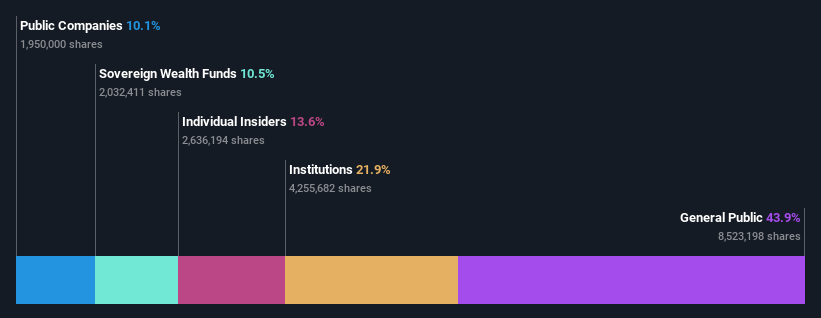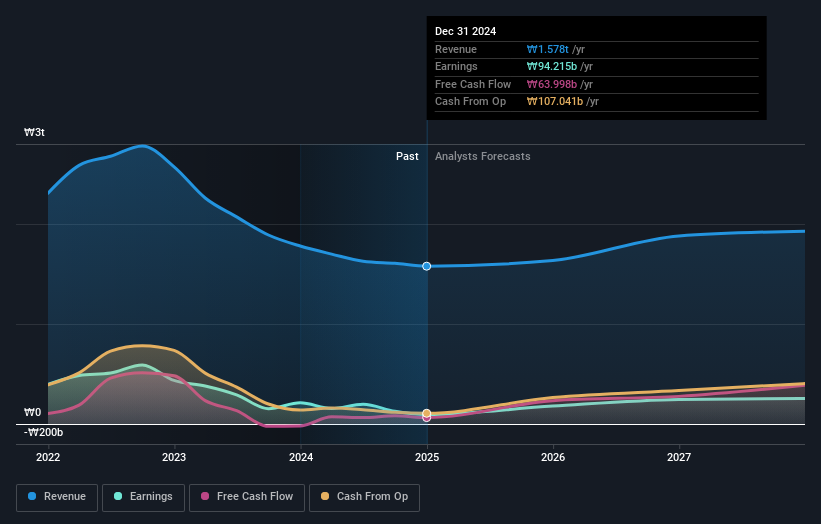- South Korea
- /
- Entertainment
- /
- KOSE:A036570
Individual investors who have a significant stake must be disappointed along with institutions after NCSOFT Corporation's (KRX:036570) market cap dropped by ₩167b

Key Insights
- NCSOFT's significant individual investors ownership suggests that the key decisions are influenced by shareholders from the larger public
- The top 11 shareholders own 50% of the company
- Insider ownership in NCSOFT is 14%
A look at the shareholders of NCSOFT Corporation (KRX:036570) can tell us which group is most powerful. The group holding the most number of shares in the company, around 44% to be precise, is individual investors. In other words, the group stands to gain the most (or lose the most) from their investment into the company.
While institutions who own 22% came under pressure after market cap dropped to ₩2.6t last week,individual investors took the most losses.
Let's take a closer look to see what the different types of shareholders can tell us about NCSOFT.
See our latest analysis for NCSOFT

What Does The Institutional Ownership Tell Us About NCSOFT?
Institutional investors commonly compare their own returns to the returns of a commonly followed index. So they generally do consider buying larger companies that are included in the relevant benchmark index.
As you can see, institutional investors have a fair amount of stake in NCSOFT. This implies the analysts working for those institutions have looked at the stock and they like it. But just like anyone else, they could be wrong. When multiple institutions own a stock, there's always a risk that they are in a 'crowded trade'. When such a trade goes wrong, multiple parties may compete to sell stock fast. This risk is higher in a company without a history of growth. You can see NCSOFT's historic earnings and revenue below, but keep in mind there's always more to the story.

We note that hedge funds don't have a meaningful investment in NCSOFT. Looking at our data, we can see that the largest shareholder is Taek-Jin Kim with 14% of shares outstanding. Meanwhile, the second and third largest shareholders, hold 10% and 10%, of the shares outstanding, respectively.
After doing some more digging, we found that the top 11 have the combined ownership of 50% in the company, suggesting that no single shareholder has significant control over the company.
While studying institutional ownership for a company can add value to your research, it is also a good practice to research analyst recommendations to get a deeper understand of a stock's expected performance. Quite a few analysts cover the stock, so you could look into forecast growth quite easily.
Insider Ownership Of NCSOFT
The definition of company insiders can be subjective and does vary between jurisdictions. Our data reflects individual insiders, capturing board members at the very least. Company management run the business, but the CEO will answer to the board, even if he or she is a member of it.
Insider ownership is positive when it signals leadership are thinking like the true owners of the company. However, high insider ownership can also give immense power to a small group within the company. This can be negative in some circumstances.
Our most recent data indicates that insiders own a reasonable proportion of NCSOFT Corporation. It is very interesting to see that insiders have a meaningful ₩357b stake in this ₩2.6t business. Most would be pleased to see the board is investing alongside them. You may wish to access this free chart showing recent trading by insiders.
General Public Ownership
The general public-- including retail investors -- own 44% stake in the company, and hence can't easily be ignored. While this group can't necessarily call the shots, it can certainly have a real influence on how the company is run.
Public Company Ownership
It appears to us that public companies own 10% of NCSOFT. It's hard to say for sure but this suggests they have entwined business interests. This might be a strategic stake, so it's worth watching this space for changes in ownership.
Next Steps:
It's always worth thinking about the different groups who own shares in a company. But to understand NCSOFT better, we need to consider many other factors. Be aware that NCSOFT is showing 2 warning signs in our investment analysis , you should know about...
If you would prefer discover what analysts are predicting in terms of future growth, do not miss this free report on analyst forecasts.
NB: Figures in this article are calculated using data from the last twelve months, which refer to the 12-month period ending on the last date of the month the financial statement is dated. This may not be consistent with full year annual report figures.
Valuation is complex, but we're here to simplify it.
Discover if NCSOFT might be undervalued or overvalued with our detailed analysis, featuring fair value estimates, potential risks, dividends, insider trades, and its financial condition.
Access Free AnalysisHave feedback on this article? Concerned about the content? Get in touch with us directly. Alternatively, email editorial-team (at) simplywallst.com.
This article by Simply Wall St is general in nature. We provide commentary based on historical data and analyst forecasts only using an unbiased methodology and our articles are not intended to be financial advice. It does not constitute a recommendation to buy or sell any stock, and does not take account of your objectives, or your financial situation. We aim to bring you long-term focused analysis driven by fundamental data. Note that our analysis may not factor in the latest price-sensitive company announcements or qualitative material. Simply Wall St has no position in any stocks mentioned.
About KOSE:A036570
Excellent balance sheet with reasonable growth potential.
Similar Companies
Market Insights
Community Narratives



